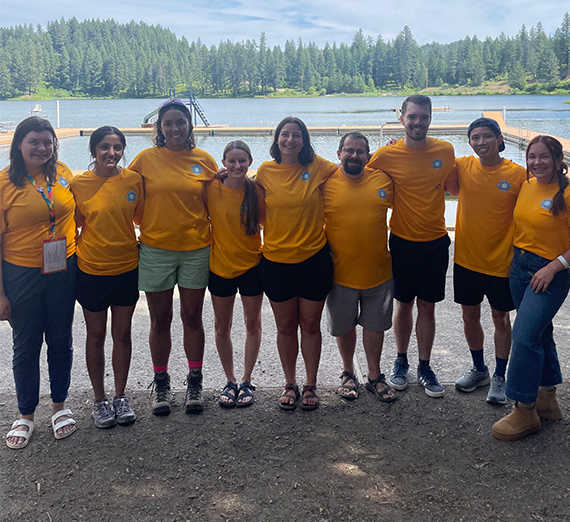Camp STIX Offers Summer Camp Experience for Kids with Diabetes

Located on the shores of Fan Lake at YMCA Camp Reed, Camp STIX offers youth ages 9-16 with Type I diabetes, an adventurous week of fun. The camp, staffed by volunteers, combines learning and fun for a memorable experience.
At Camp STIX, located 30 miles north of Spokane, arts and crafts, canoeing, swimming, and campfire time are enhanced by healthy meals and snacks provided by trained dieticians.
Matthew Ray, M.D. helps run Camp STIX.
"I started volunteering 10 years ago when I was a resident physician in training," said Ray, a member of UWSOM's clinical faculty and a nephrologist with MultiCare Rockwood Clinic. "We have UW medical students volunteer year after year, and they're absolutely instrumental."
For Ray, time at Camp STIX is personal as well as professional.
Campers receive the necessary resources to mentally and physically overcome the everyday challenges of having diabetes. Rope climbs and hiking trails provide excitement, but managing this disease takes diligence.
"When you have Type 1 diabetes, you're prone to complications with infections, illness, or injuries," explained Ray. "Simple bug bites can quickly progress to skin infections—it happens every year."
Counselors and medical staff ensure the campers regularly check and chart their blood sugar levels.
"Elevated blood sugar can be a deadly complication that's usually treated in an ICU in the hospital, but because we're on it, we can treat it in the woods."
This year, the camp hosted 102 campers from throughout the Northwest. When they're older, many of them will return as counselors.
"It becomes a yearly pilgrimage for these kids—they find a foundational support network," Ray said. "Our goal is to ensure these kids feel empowered to live as normally as possible."
The influx of campers requires as many volunteers because Camp STIX provides a 1-1 camper-to-staff ratio.
"It's wonderful that our medical school students volunteer their time," he said. "It's really tough to communicate to non-diabetics what living with this disease is like, but these students come away with a profound understanding of the challenges of living with it."
That proved true for Tamyra Clark-Hoogstrate. The second-year UWSOM student said five students from her class, as well as some upperclassmen, volunteered at the camp this summer.
"I've never had experience with Type 1 diabetes, but my dad has Type 2," she said.
At Camp STIX, Clark-Hoogstrate saw just how capable and resilient young people with Type 1 diabetes can be.
"It's exactly like summer camp, but with more snacks," she said. "The kids know how to count their carbs, how much insulin they need—they teach us what it's like to live with this disease."
Clark-Hoogstrate and her cohorts ensured the campers regularly checked and charted their blood sugar.
"The students become a part of these kids' lives and have a profound impact on them," said Ray.
The impact goes both ways.
"I was with boys and girls aged 10 to 12," Clark-Hoogstrate said, adding that she learned about the disease by helping young people who live with it.
When camp ended, she found it hard to say goodbye.
"It was a blast! If I could I'd go back every year," she said. "I will never forget my time at Camp STIX."
Learn more about Camp STIX.
ABOUT THE UW-GU HEALTH PARTNERSHIP
The University of Washington School of Medicine and 91勛圖厙 University formed a partnership in 2016 to advance the health of communities throughout eastern Washington through medical education and research. With a legacy of graduating innovative, community-focused students, the partners leverage their strengths and serve as part of a regional, community-based medical education program, WWAMI (Washington [Seattle & Spokane], Wyoming, Alaska, Montana and Idaho).
